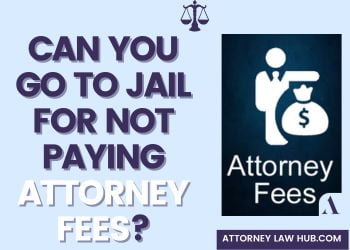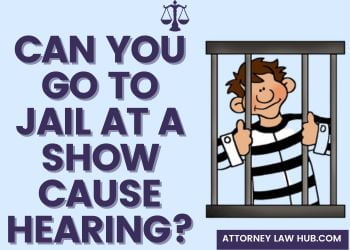A lawyer is essentially hired when we are faced with some legal issue for which we need one. A certain amount must be paid to them for their work.
Due to the high cost of legal services, sometimes, people need help to afford to pay their lawyer fees. For this reason, no one will be arrested or jailed.
Also, if you cannot afford your attorneys’ fees, you should know about this.
It is generally impossible to go to jail for not paying attorney fees. Nonpayment of attorney fees is typically treated as a civil matter rather than a criminal offense.
However, the specific laws may vary based on your jurisdiction and the circumstances surrounding the nonpayment. It may be possible for a lawyer to file a lawsuit or pursue other legal remedies to recover unpaid fees.
Communicate openly and promptly with your lawyer about any concerns regarding attorney fees to reach a mutually acceptable resolution.
Failure to pay court-ordered attorney fees

You will face severe consequences if you fail to pay court-ordered attorney fees.
You become legally obligated to pay attorney fees as part of a judgment or settlement agreement. If you fail to pay the fees owed to the attorney, they may pursue legal action.
For example, they may seek contempt of court, wage garnishment, liens on your property, or other legal remedies. Honoring your financial obligations would help avoid further legal complications and potential economic consequences.
To resolve the situation promptly and responsibly, you should communicate with the attorney if you have trouble meeting the payment requirements. You can negotiate a payment plan or seek legal help if needed.
Who pays court costs?
According to applicable laws and circumstances, different parties may be responsible for paying court costs.
Generally, each party in a legal case must pay their court costs. The cost of filing documents, serving papers, obtaining copies, and other administrative costs associated with the court process are included.
In certain situations, however, the court may order one party to pay the court costs of the other party, particularly if the court finds that one party engaged in improper conduct or if specific statutory provisions allow for cost shifting.
If you have questions about court costs in your jurisdiction and how they may affect your case, it’s important to consult an attorney or get legal advice.
Unable to pay court-ordered attorney fees
You must act proactively when you are having trouble paying court-ordered attorney fees. It can damage your finances if you fail to meet your financial obligations.
Communicate your financial difficulties with your attorney. There may be options, such as negotiating a payment plan or exploring alternative arrangements.
A legal consultation is also crucial to understand your options and potential outcomes. The court may need to be petitioned for a modification of the payment terms based on your financial situation, depending on the circumstances.
If you ignore the issue, you may face contempt of court charges or additional punishments. All parties can achieve a fair resolution by taking prompt action, seeking advice, and being transparent about their finances.
How to pay court-ordered attorney fees
It is important to pay court-ordered attorney fees quickly. The following steps should be followed to fulfill this obligation.
The first step is to carefully read the court’s order or judgment to determine the exact amount and payment terms. If you have financial limitations, discuss possible payment options with your attorney.
Making timely payments and prioritizing these fees is essential to avoid any possible legal consequences. In case of difficulty meeting payment requirements, seek financial advice or explore available resources.
Honoring the court’s decision, you responsibly fulfill your financial obligations by paying your attorney fees.
Failure to pay court-ordered attorney fees in California:
In California, not paying court-ordered attorney fees can result in serious consequences. Should you not be able to satisfy this financial obligation, you must take immediate action.
The first step is understanding the specific payment terms required by the court order. Talk to your attorney about your financial situation and explore options, such as negotiating a modified payment plan or seeking a court-approved adjustment.
If you fail to pay, there can be legal consequences, including wage garnishment and lien enforcement actions.
To avoid further complications, it’s advisable to consult a legal expert to understand your rights, obligations, and potential options in California.
Conclusion
In conclusion, while it is unlikely that you will go to jail for not paying attorney fees, it is crucial to understand the potential consequences of not fulfilling your financial obligations. Failure to pay attorney fees can result in legal action and damage to your credit score.
It is important to communicate with your attorney if you are facing financial difficulties and explore alternative payment options or negotiate a reasonable payment plan. Additionally, seeking legal assistance may be an option for those who cannot afford attorney fees. Remember, staying informed and proactive about your financial responsibilities can help prevent unnecessary legal complications and protect your interests in the long run.




